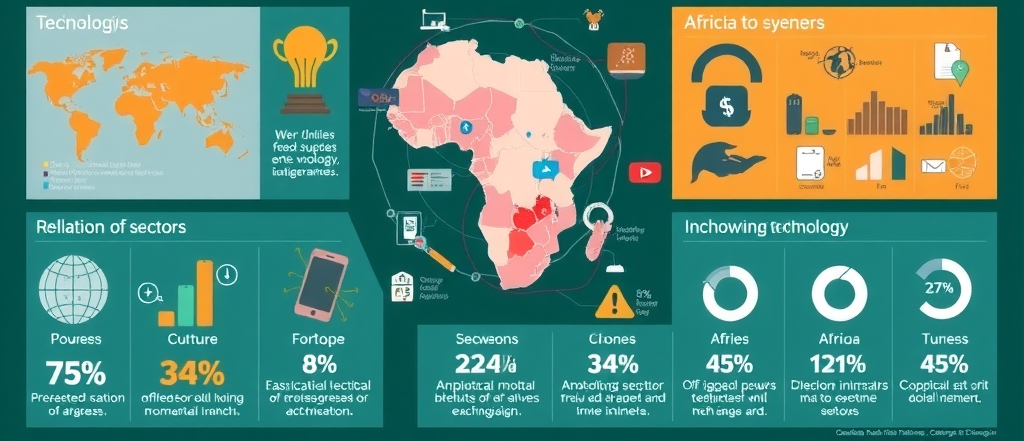Did you know that productivity growth in Africa has fallen from an annual rate of 2.2% between 2000 and 2010 to just 0.8% in the last decade? This staggering statistic underscores the pressing economic challenges faced across the continent. However, experts like Acha Leke, Senior Partner at McKinsey & Company, argue that digital technology impacts Africa significantly, presenting opportunities to reverse this trend. In this article, we will explore the potential of digital transformation within various sectors and how it acts as an engine for economic growth in Africa.
Overview of the Digital Technology Impact in Africa
Understanding the Current Economic Landscape
African economies have historically struggled with low productivity, as evidenced by the revelations from Acha Leke. Digital technology's impact in Africa can be explored through various statistics showing that in numerous sectors, Africa ranks either as the least or second least productive region globally. The harsh reality is that even as the population grows, with projections indicating that by 2030, a significant portion will be living below the poverty line, the potential for economic expansion exists through digital innovation.
Moreover, the continent's GDP per capita growth has lagged since 1990, averaging only 1.1% annually. There’s an urgent need for actionable solutions that can enhance productivity, empower industries, and drive economic reforms. The integration of digital technology can help bridge these gaps, enabling various sectors to flourish under optimized operations and growth prospects.
The Role of Productivity in Africa's Economic Challenges
Low productivity remains the principal barrier hindering Africa's economic growth. Leke points out that across sectors such as agriculture, manufacturing, and services, the lack of efficient processes is crippling potential expansion. Boosting productivity through digital technology impact Africa is not only vital for the economy but also for improving the livelihoods of millions. By leveraging digital tools, sectors can achieve greater efficiency, leading to reduced costs and increased outputs.
Emerging success stories in mobile banking, agricultural innovations, and educational resources show that investments in digital technology can lead to significant improvements in productivity levels across various industries. The key lies in harnessing these advancements effectively for broader economic development.

The Digital Transformation Journey
Success Stories of Digital Innovation
Across the continent, numerous instances of innovative digital transformations are reshaping the economic landscape. For instance, in Ghana, the introduction of digital payment systems has revolutionized financial transactions, providing easier access to banking services for millions who were previously unbanked. Leke highlights, “Digital is the single most important lever to transform productivity in Africa.” This sentiment echoes throughout various sectors embracing digitalization.
Companies harnessing digital technology have reported positive outcomes in operational efficiency and customer engagement. These success stories are vital in showcasing how African nations can replicate similar models to scale benefits across numerous industries. The transformation journey is still underway, and realizing its full potential will require substantial investments and strategic implementations.

Mobile Banking and Financial Services Growth
One of the remarkable examples of rapid digital growth in Africa is through mobile banking and financial services. With 60% of the world’s mobile bank accounts originating from Africa, the sector exemplifies how digital advancements can streamline financial access. Innovations like M-Pesa in Kenya have not only transformed personal finance but have also facilitated broader economic activities.
This growth in mobile banking is not merely a trend but a fundamental shift, allowing individuals to conduct transactions, save money, and access loans directly from their mobile devices. The potential for digital technology to improve financial literacy and inclusion stands as a beacon of hope for future economic resilience in Africa.

Challenges and Opportunities in Digital Technology
Barriers to Digital Adoption
While the future looks promising, several challenges impede the broader adoption of digital technology across Africa. Infrastructure issues remain a significant barrier, particularly in rural areas where connectivity is inadequate. As indicated by Leke, “We are either the least productive or the second-least productive,” emphasizing that poor infrastructure hinders industries from accessing digital innovations.
Efforts to build robust infrastructures and support systems for digital adoption are crucial. Governments and stakeholders must invest in connectivity and digital resources to overcome these barriers, ensuring that all populations benefit from technological advancements.

The Digital Divide and Its Implications
The digital divide represents a significant challenge for many African nations, where disparities in technology access remain pronounced. Urban centers often enjoy better technology and resources compared to rural areas, exacerbating inequalities in wealth and opportunity. This divide threatens to widen if unaddressed, as those without access miss out on the transformative benefits of digital technology impact Africa .
Efforts toward inclusivity must be prioritized to ensure that all communities can participate in the digital economy actively. Initiatives focusing on education, technology access, and lowering operational costs are essential for bridging this gap. Programs like the Tech Scholarship Program in Oyo State by Pluralcode are pivotal in equipping the youth with necessary digital skills.
Expert Insights on Digital Technology's Role
Acha Leke's Perspective on Productivity
Acha Leke, a prominent figure at McKinsey & Company, emphasizes that addressing productivity is crucial for Africa’s future. According to him, digital transformations present a real chance to improve productivity across various sectors. “Digital is the single most important lever to transform productivity in Africa,” states Leke, pointing towards a path of urgency and potential.
His insights underline the pressing need for African economies to embrace digital technologies as a core element of their growth strategies. By aligning with this vision, stakeholders can create an environment conducive to substantial productivity gains, potentially changing the African narrative on the global stage.
The Future of Work in a Digital Africa
As the work landscape shifts towards digitalization, the future holds numerous implications for Africa's workforce. Young professionals are stepping into roles that leverage technology, accentuating a drive towards innovation and collaborative work environments. This shift necessitates a reimagining of traditional job roles while calling for a skilled workforce well-versed in digital technology.
By fostering a culture of innovation, African nations can secure a competitive edge, enabling their workforce to thrive in and contribute to the global economy. The rise of tech startups and innovative enterprises offers a glimpse into the skilled economy that Africa can build with the right support. Initiatives like the Nigerian Hackathon are crucial in driving innovation and social impact through technology.

Key Takeaways and Actionable Insights

Strategies for Embracing Digital Transformation
-
Invest in infrastructure to boost connectivity and digital access.
-
Encourage partnerships between tech companies and government agencies to promote innovation.
-
Develop educational programs aimed at enhancing digital literacy across all demographics.
By implementing these strategies, Africa can create an environment ripe for digital growth, ultimately shaping a more prosperous future.
Encouraging Techno-Optimism in Africa
Championing a mindset of techno-optimism is imperative for motivating stakeholders toward embracing digital innovation. This perspective emphasizes the belief that technology is a critical solution to many of Africa’s challenges, encouraging exploration and investment in advancements. Through collective effort, communities can harness digital technologies for societal betterment and long-term growth.
People Also Ask
How has technology impacted Africa?
Technology has significantly transformed various sectors in Africa, facilitating improvements in financial services, agriculture, and education. The rise of mobile banking and digital innovations has created paths for greater economic participation and growth.
What are the challenges of digital technology in Africa?
Key challenges include inadequate infrastructure, digital literacy gaps, and economic inequalities. Addressing these challenges is essential for maximizing the benefits of digital transformation.
What is the digital transformation in Africa?
The digital transformation in Africa refers to the integration of digital technologies across sectors, enhancing productivity, customer engagement, and access to services.
How has digital technology impacted the world?
Globally, digital technology has reshaped economies, transforming businesses and societies by enhancing communication, enabling innovation, and fostering economic growth.
Conclusion: The Path Forward for Africa
The journey toward realizing the full potential of digital technology impact Africa requires collaborative effort from governments, private sectors, and educational institutions. By investing in technology, building infrastructure, and fostering a culture of innovation, Africa can overcome endemic productivity challenges and drive new economic growth. The potential is vast, and the time for action is now.

Call to Action
Discover more insights on Africa's digital economy and opportunities at Afridigest, paving the way for the continent's economic transformation.
“Discover Afridigest for more insights on Africa's digital economy and opportunities.”
 Add Row
Add Row  Add
Add 




Write A Comment